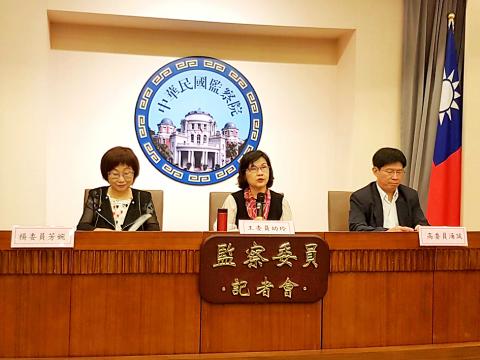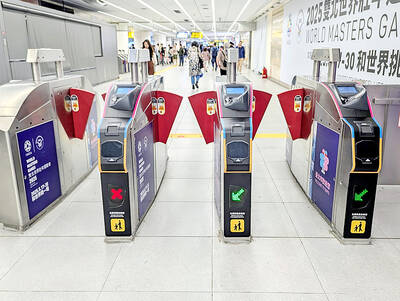One suicide and several suicide attempts have resulted from poor conditions at the Lyudao Prison on Taitung County’s Green Island (綠島), three Control Yuan members said yesterday, citing an investigation they conducted.
Control Yuan members Wang Yu-ling (王幼玲), Kao Yung-cheng (高涌誠) and Yang Fang-wen (楊芳婉) began the probe in May and found many inmates faced excessive periods of solitary confinement — one for more than 14 years.
The conditions have led to six suicide attempts, in which one person died, in the past three years, they said, adding that the prison was in breach of the UN Convention against Torture and Other Cruel, Inhuman or Degrading Treatment or Punishment.

Photo: Hsieh Chun-lin, Taipei Times
The members, who launched the investigation at the request of a human rights organization, said that they found the Ministry of Justice’s Agency of Corrections had not adequately overseen the prison.
During interviews they conducted with six inmates on May 6, the members heard that an inmate surnamed Liu (劉), a murder convict, had been in solitary confinement for 14 years, 14 days.
Of the prison’s 96 current inmates, 37 were in solitary confinement, they said.
Over the past five years 21 inmates other than Liu have faced solitary confinement for one to 12 months, three for one to two years, and two for two to six years, they said.
Since last year, 19 have been restrained for seven days or more, with one having been restrained for 76 days, they said.
The prison for a long time has lacked personnel properly trained in procedures, while many were hired only a week into their probationary periods, the members said.
The ministry lacks sufficient regulations governing the use of restraints and solitary confinement, while disciplinary measures and appeals have not been properly handled, they said.
It was clear that there had been no consideration of how these measures could be misused by prisons, or the physical or psychological harm they could inflict on inmates, the members said.
The prison accounted for 12.6 percent of inmates nationwide in solitary confinement, they said, adding that many at the prison had spent 57 percent of their time there in solitary confinement.
The prison told the members that many of those restrained had been incapacitated for their own protection, but there was no record of the prisoners being supervised to ensure their protection, they said.

A magnitude 6.4 earthquake struck off the coast of Hualien County in eastern Taiwan at 7pm yesterday, the Central Weather Administration (CWA) said. The epicenter of the temblor was at sea, about 69.9km south of Hualien County Hall, at a depth of 30.9km, it said. There were no immediate reports of damage resulting from the quake. The earthquake’s intensity, which gauges the actual effect of a temblor, was highest in Taitung County’s Changbin Township (長濱), where it measured 5 on Taiwan’s seven-tier intensity scale. The quake also measured an intensity of 4 in Hualien, Nantou, Chiayi, Yunlin, Changhua and Miaoli counties, as well as

Credit departments of farmers’ and fishers’ associations blocked a total of more than NT$180 million (US$6.01 million) from being lost to scams last year, National Police Agency (NPA) data showed. The Agricultural Finance Agency (AFA) said last week that staff of farmers’ and fishers’ associations’ credit departments are required to implement fraud prevention measures when they serve clients at the counter. They would ask clients about personal financial management activities whenever they suspect there might be a fraud situation, and would immediately report the incident to local authorities, which would send police officers to the site to help, it said. NPA data showed

ENERGY RESILIENCE: Although Alaska is open for investments, Taiwan is sourcing its gas from the Middle East, and the sea routes carry risks, Ho Cheng-hui said US government officials’ high-profile reception of a Taiwanese representative at the Alaska Sustainable Energy Conference indicated the emergence of an Indo-Pacific energy resilience alliance, an academic said. Presidential Office Secretary-General Pan Men-an (潘孟安) attended the conference in Alaska on Thursday last week at the invitation of the US government. Pan visited oil and gas facilities with senior US officials, including US Secretary of the Interior Doug Burgum, US Secretary of Energy Chris Wright, Alaska Governor Mike Dunleavy and US Senator Daniel Sullivan. Pan attending the conference on behalf of President William Lai (賴清德) shows a significant elevation in diplomatic representation,

The Taipei MRT is to begin accepting mobile payment services in the fall, Taipei Rapid Transit Corp said on Saturday. When the company finishes the installation of new payment units at ticketing gates in October, MRT passengers can use credit cards, Apple Pay, Google Pay and Samsung Pay, the operator said. In addition, the MRT would also provide QR payment codes — which would be compatible with Line Pay, Jkopay, iPass Money, PXPay Plus, EasyWallet, iCash Pay, Taiwan Pay and Taishin Pay — to access the railway system. Currently, passengers can access the Taipei MRT by buying a single-journey token or using EasyCard,